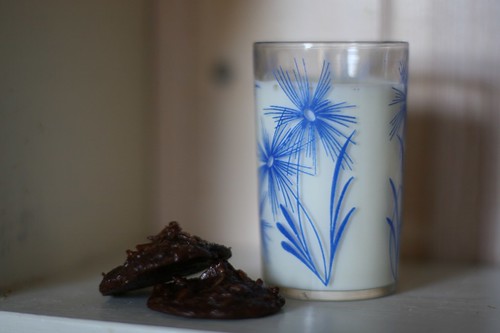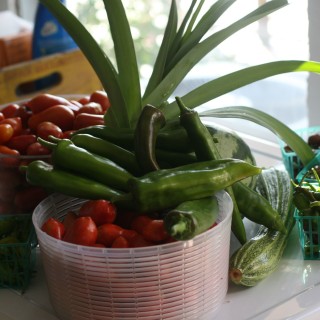
Do you mind if I talk about milk today? Milk has been on my mind lately. A funny thing to spend your quiet moments thinking about, I realize but, that’s me and the way I think.
I never really thought much about milk until we started giving it to the boys when they turned one. We always just bought whatever low fat milk was the least expensive before we had kids because we used it sparingly in our diet and we were on a budget. Milk was an after thought. And every once in a while we’d buy Straus Family Creamery milk because it was so neat that it came in the glass bottle with the cream at the top. We treated more as a novelty than anything else. But within the last year or so my thoughts on milk have become more passionate. There’s so much to consider when buying milk, low fat, non fat, whole fat, and what about raw? Then there is the price. Milk is somewhat expensive to begin with but then the organic is even more expensive and switching to a diet of raw milk might cause you to take out a second mortgage on the house. And should we even be drinking cows milk at all? What about the rice milks and soy milks? Then there is my friend who only would give her daughters goats milk because cows milk is harder to digest. There’s so much to consider it makes my brain hurt.
After reading The Omnivore’s Dilemma, Scott and I made the switch to exclusively drinking organic milk. His descriptions of the mid-west feed lots and corn fields turned our eating around in a lot of ways, frankly. When babies are in there second year between the ages of one and two, it’s recommended that you give them about four glasses of milk a day. That’s a lot of milk, especially when you have two thirsty boys. But we realized that all of the trace chemicals that collect in standard milk just wasn’t worth the savings.
Then after reading In Defense of Food I became worried about the percentage of fat in the milk we drank. This book by Mr. Pollan had a big influence on me, but there is this one little sentence in that book that haunted me. He never really expanded on it or meant it to be a key point but for some reason I thought about it everytime I went to the store to pick up another gallon. He said that low fat and non fat milk is often beefed up with dry milk to make it creamier. And that dry milk contains oxidized cholesterol, which is a bad kind of cholesterol. Not the good kind that whole, raw milk provides. This is the artery clogging kind of cholesterol. Knowing Scott’s family’s struggles with heart disease I take great concern in the health of all three of my boy’s (big and small) hearts. Bad cholesterol, even in tiny amounts, is not something I want to invite into their lives, or mine frankly. So we made a vow at that point to only buy whole organic milk.
But now I’ve been thinking of raw milk. I keep hearing and reading more and more about it. I had heard of raw milk before and been a tad bit curious, but being a good ultra-pasturized raised American, it just seemed like inviting a whole lot of risk into your life by drinking it. I’ve been pregnant and breastfeeding for many years in a row and that’s always one of the biggest no-no’s: to eat unpasturized anything. So I always passed it up. But lately I’ve been thinking about it again. Both my father and Scott’s father were raised on farms and both drank raw milk growing up. And they survived just fine. Maybe this pasturization preaching that I’ve heard my whole life really isn’t as vital as I thought.
If the idea is to eat things that are processed less and in a more whole state, shouldn’t raw milk be what we all drink? If pasturization makes milk completely devoid of nutrients, why do you we even bother to drink it? I’ve heard a few times now that raw milk is like liquid medicine. Is this true? I suppose the only thing holding me back at this point from converting to a raw milk drinker is the price. At our local grocery store a gallon of raw milk ranges from $16-$20/gallon! Versus $4 for standard milk and $6.49 for organic. We consume about two gallons a week so you can see how that would add up for us. I realize that we are incredibly fortunate in this economy to even be able to afford milk, let alone organic, let alone even contemplate paying for raw milk.
And you realize too that switching to raw milk would only be the beginning. Soon we’d have to switch to raw cheeses, raw milk, raw ice cream and raw butter (which was $12.99/lb!!). If money were no object, I would switch us all over tomorrow. But like most folks, we have to keep a watchful eye on our spending habits.
We had a new friend over yesterday for the afternoon. Not knowing that she was into nutrition or food at all she suddenly started telling me all about her families switch to raw milk. Isn’t that funny, how the world works? Just when your thoughts are all about milk, in walks a converted raw milk drinker into your family room to tell you all about it. Anyway it made me realize that I’m probably not the only milk thinker out there. Do you drink milk? What kind do you drink and why??








We drink milk. Not a lot as Mike is lactose intolerant, but some. I was buying raw for a while, but can only get it in half gallons and unless we’re cooking with milk we rarely go through more than a quart in a week.
These days we buy our milk from Golden Glen Creamery in glass bottles. Our weekly selection usually includes a quart of 2% or whole milk, a pint of half-and-half and often a pint of heavy cream. Mmmmm. Good milk is well worth the price (and the special trip).
I’m the granddaughter of a dairy farmer but I don’t drink milk. I’m allergic–it gives me horrible eczema–but I’ve done a lot of reading about it and I’ve just come to the conclusion that drinking cow’s milk or goat’s milk is not quite normal for humans. Some humans have a lactose-processing gene evolved, but most don’t, and the reason we drink cow’s milk (IMHO) instead of giraffe milk or whale milk or gorilla milk is because cows are mammals of convenience. They’ll stand still and LET you milk them, and you can keep them penned up for a while eating grass and they won’t try to kill you for it. Don’t get me wrong, butter and cream and cheese are delicious, and effective ways of preserving calories that would otherwise go to waste, but in general I don’t think that milk is right for me or my family. As for your family’s heart issues, cow’s milk is designed to nourish and fatten baby cows into big full-size cows. There’s a lot of nutrition per ounce. Maybe too much?
That said, if I WAS going to drink milk, I would definitely go with raw, whole milk.
I hope you’re able to find a good solution for yourself and your family. In the meantime, thanks for the beautiful blog. Love reading your adventures.
Yesterday on Terry Gross there was an interview with a woman, a food historian I believe her introduction said, that just completed a book on, you guessed it, Milk. It’s a short interview and she sounds like Katherine Hepburn and given your post you’ll love it. I’m sure the interview can be audio streamed so you can hear it or at least read about her. I didn’t hear the entire interview but caught twice the part where she talks about organic and how that is such a small piece of the whole when considering milk, and for anything else I wanted to add. We don’t use much milk and flip back and forth between Clover because I grew up in Sonoma County and Strauss because they run their dairy on methane and I like the glass bottles. The Strauss milk goes sour sometimes though before we can use it all. I’ve never had raw milk and will now have to give it a try.
I usually lurk but I had to click over and comment! I cook vegan 90% of the time in my house (and 100% organic and from my state). My husband likes milk from time to time though and I buy Strauss as well. When I researched what milk to buy they impressed me the most-they’re local, organic, environmentally friendly and from what I read, they treat their animals well. It’s really hard when you don’t usually eat animal products to research what to buy. I wish there was more information on this. I’m always willing to pay more when it comes to animals and the environment.
We don’t drink a lot of milk in my house, but when we do it’s usually 2%, Kroger brand, I think. Libby will be 3 in April, and she still doesn’t drink cow’s milk except for maybe twice a month since she still nurses several times a day. When Libby was nearing a year old the discussion of milk came up since she was still nursing and I didn’t plan on making her stop. Someone asked, “What will you do when she turns one and has to drink milk?” My husband said, “Well, she nurses, that’s her milk.” Now I definitely get side glances when someone finds out that she doesn’t drink cow’s milk and I don’t plan on making her stop nursing and don’t see a need to make her drink cow’s milk as long as she’s nursing. I just point out that cow’s milk is cow’s breastmilk, and that there’s no reason why that would be better for my human daughter than human breastmilk from her own mama. When she does stop nursing, if she wants to drink milk we will probably switch to our Giant Eagle brand because the milk comes from our local farmers (we have a milk processing plant here in Marietta, and the Giant Eagle milk comes from there.) We can’t afford organic milk, but when Libby is drinking it, I figure local is better than shipped in. There’s my two cents 😉 Kudos to you for thinking about what many many people don’t think about.
I was raised on Dairy Goat milk and when our house is completed we will be buying a few goats to keep and milk. We used to have goats that gave a gallon of milk everyday and my family of seven goes through about that much, sometimes more.
Thank you for all of the fantastic comments! I really appreciate hearing your opinions.
Katrina – I’ll definately have to look up that interview. And read the book. I’m no surprised that there is a book devoted to milk, after I started thinking about all the issues there is with milk, it seems that discussing it would fill up at least one books worth of pages.
Gardenmama – Nursing instead of giving cows milk is certainly the way to go. Keep it up as long as you can!
Hi Rachel – I too really like how Strauss runs their dairy. And the glass bottles just make drinking their milk so much more of an authetic experience plus the idea that you can return the bottles and reuse them is great.
Laura – Sounds like your local dairy is like Strauss. Does Golden Glen make eggnog? Strauss’ is divine.
Jengod – I often wonder if we should even be drinking milk at all. At this point I think my skinny little boys need the extra fat and nutrients, but as for myself I rarely have any milk. Maybe a bit in coffee or a rare bowl of cereal. I actually often feel sorry for the cows…after having to pump at work while nursing it made me feel like a dairy cow myself. Not a great feeling.
After reading “In Defense of Food” and now Nina Planck’s “Real Food”, I’ve also just made the switch to raw milk. It is way more expensive than the typical pasturized homogenized stuff, but it tastes way better and I find it to be way less “tooty”, if you know what I mean.
Now I’m going to get up on my soap box. Americans have the cheapest food in the world and the percentage of our income that we spend on our food is, I believe, about the lowest in the world. We also have the most industrialized, processed, least nutritionally sound food. I have come to believe that our industrialized food is making a lot of us sick and that if we collectively spent more for better food that we would be a lot healthier. That would lead to lower medical costs for all of us. If we spend more up front for healthier food in the long run we will come out ahead. And if enough of us ask for and spend our money on the good stuff in time it will become less expensive – the consumer drives supply and demand. It’s happening with organic food – you can find it at the largest retailers now and it’s not as expensive as it used to be. We need to demand good quality food. The only way to rid our food supply of junk is to not buy it.
We don’t drink milk. If it’s called for in a recipe then I use a nut milk instead. Other than that we only drink water. When I was in college I learned about the amount of blood and pus in dairy products and haven’t been able to even think about consuming dairy without starting to feel sick. I know that raw and organic don’t have these issues but I guess it was enough to bring the whole dairy thing to a hault for me. It’s been 12 years and I don’t see us ever going back.
We drink a limited amount of milk in my family, usually. However, when I am pregnant (which I am right now) I have a heavy intuitive craving for milk of any kind. I prefer Claravale Dairy raw milk. The dairy is relatively local (used to be much more so before beurocracy forced them to move to a different county recently) and is delicious. When I was at the grocery store last week I was stocking up on a whole lot of stuff and just couldn’t get myself to put the raw milk in the cart at twice the price as the regular organic milk in cardboard. It has been a while since I drank non-raw and I notice a difference for sure. The cooked milk makes me phlegmy where the raw does not.
If you do some reading about the regulation differences between regular and raw you’ll find some very interesting info!
Erin, that Claravale milk is the raw milk that is in our store as well. We finished our gallon of milk this morning. I think I might just try raw this weekend!
Thanks again for all of your wonderful comments. Its so great to have the internet to meet other like-minded thinkers.
Whoa! A group of friends and I talked about this just yesterday. We definitely drink organic milk in our house. It costs the same, maybe even less, at Whole Foods than any milk at the big grocery stores. I think America is really overcautious about pasteurization. In Europe unpasteurized cheese and milk is very common.
Just wanted to stop back in and say that I just got back from the market with our first quart of Claravale raw whole milk. I also bought a gallon of the regular organic too to use for other purposes. But at least we can give the boys glasses of raw milk with dinner.
Congrats on your raw milk purchase! Be sure to report back on how it goes!
For what it’s worth, my milk epiphany came from a book called The Revolution Will Not Be Microwaved by Sandor Ellix Katz. Highly recommended. It’s a wonderful window into the world of non-industrial food production.
I tried raw milk recently and didn’t like it because it tastes more animal- I was raised as a vegetarian and have continued to be one and am very sensitive to animal flavor. I don’t like anything goaty and the raw cow’s milk was, well, it tasted like an animal.
I think for people who eat meat this isn’t an issue. My husband LOVED it. I love that it hasn’t been processed. I’ve had raw milk cheese which was quite good and didn’t retain that gamey flavor.
My kid is excessively picky and doesn’t like cheese or milk so I don’t have to worry as much about what milk I put in his body. But I always buy locally produced at the very least and never ultra pasteurized.
I don’t drink milk but I do cook with it and if I could get my hands on affordable raw milk every week (there is a waiting list of at least 30 families for the local raw milk!) I would choose to cook with it.
I think America is way too freaked out about food contamination. In talking to the producers of raw milk in my area (there’s only one) I asked why they are so heavily regulated. After listening to her I observed that it seemed to me that pasteurization simply allowed milk producers to be less sanitary in general because their product is always cooked to kill contamination. Raw milk producers here have to follow strict rules of cleanliness and are only allowed so many animals per acre of land they have to prevent the kind of disease and contamination larger herds of animals create.
I think if all milk was raw the whole country of dairymen would be held up to a much higher standard of animal husbandry.
That would be a good thing for everyone!!
Wow, didn’t realize I had so much to say about it.
After buying organic milk for several years, I have started buying raw (also organic) milk directly from a local farmer. I pay $4 a gallon, far less than any organic milk in the store. I think the dangers of raw milk have been blown way out of proportion. I trust milk from Tamarlane Farm much more than I trust food from a factory owned by a multinational conglomerate.
Angelina – Yes, I noticed that the raw milk tastes more ‘earthy’ or ‘gamey’ than the pasturized milk. I don’t know if I like that more or less than what we’ve been regularly drinking, I’ll have to drink more of it before I can form an opinion. I kept most of the quart for my boys to drink.
Annika- Thanks for visiting my blog. Wow! $4/gallon! You are very lucky to have a dairy like that around. We live in such an agricultural area, I don’t know why we can’t find something like that here. I wonder if either I haven’t looked hard enough or whether things are regulated here differently. Things just seem so much more progressive in Vermont. We hope to visit there this coming summer!
Raw milk is very expensive! In our house we drink Straus or another organic brand exclusively (don’t you love living in Northern California?!). I doubt that low fat milk from Straus has powdered milk in it, and the other organic brands likely do not either. Hmm. Good post and lots to think about.
I’ve not heard of “raw milk” myself but perhaps it’s just hidden here in the UK.
Perhaps you could find a middle road and have half a gallon of raw and 1.5 gallons normal – so you all get a few more nutrients than you would have, without breaking the bank. Then perhaps start saving up specificlly so that un june you can have a gallon of each and then by new year perhaps even have both galllons of raw milk.
As I said, I’ve not heard of raw milk so I can’t give any information on it’s nutrition, but if people you know have been fine drinking it, it’s a little easier to see the effects.
Although children do need to be looked after; the more un-treated foods they have, the better their immune systems should be later on in life.
That’s just my opinion and I’m not sure if someone else ealready voiced it, but I thought i’d leave that option open in case it hadn’t.
Stars Above,
~Rose.
If you can get hooked up directly with a dairy farmer, like through a co-op, raw milk should become much cheaper for you. Out here in KY where it’s illegal to buy and sell the stuff we paid $8 a gallon for our share, and could visit the cows if we wanted too. I figure why buy milk at all if all the good stuff is ruined in it, the cows didn’t even graze so there’s not much good to begin with, and it’s filled with added dry milk.
Raw milk is by far the best ever. it tastes amazingly different than any pasteurized dairy — and I have been an organic baby my whole life. I would HIGHLY recommend making the jump to Raw Milk — depending on how much milk you drink a week in your family — you could always split a share!
call to see if they still sell it retail…
Sonoma, CA 95476 Whole Foods (Sonoma) 201 W Napa St 707-938-8500
Sonoma, CA 95476 Sonoma Market 500 W. Napa St. #550 707-996-3411
Sonoma, CA 95476 Planet Organics 19449 Riverside Dr, Suite 100 800-956-5855
Raw milk from a family cow that is pasture fed is truly delicious! Our raw milk comes through the Leras Family farm who raises a heritage breed (Jersey) cows who produce nutrient rich A2 milk. It truly has a wonderful taste, and important health benefits. Please read more about this fantastic Sonoma County family resource here:
http://sono-ma.blogspot.com/2010/01/exploring-benefits-of-family-cow-and.html
We started drinking raw milk, and yogurt(so delicious) and getting eggs at an amish farm in PA. Its easier out there, less regulation. We have moved to NC now and the options are limited. My girls no longer like store bought milk, its like the difference between fresh and stale air. But they have great health, have never had an ear infection for instance and no other modern ailments kids seem to regularly have these days. Store bought milk is worthless in terms of nutrients. The heat denatures vitamin A and D, and if the cows aren’t in the sun and eating grass the milk won’t have regular nutrients. You also need fat for fat soluable vituamins like D and calcuim be even be absorbed into the body. I have to wonder at nutritionist who tell people to eat low fat and lots of calcium. There is a wealth of information on the Weston A Price website. Because of WAP we drink raw milk, make bone broth once a week and limit the sugar. Your kids will be health and have a long attention span, promise. BTY, love all your productivity. Your an inspiration doing all these natural things. I’m doing the no poo challenge now, love your gumption.
Christina
This is so wonderful! A great post and lots of information.
In my family (doctors for generations and I am one of them) we only drink raw milk from pastured cows. We also make everything in the house: butter, cheese, buttermilk, yogurt, cream, kefir, etc. It’s very important when drinking raw milk to make sure the cows are healthy and usually the farmer will let you know… Our providers are mennonites and they do treat cows with antibiotics but only when a cow is really sick and that milk is not going for consumption… They also respect the animals and take good care of them plus they are very honest. My children are drinking raw milk and we never had an issue. To be honest with you in over 15 years I’ve only had patients with salmonella and E. Coli from store bought pasteurized products. If you store the raw milk in a clean air tight container at about 35 F in the fridge you should have no problems for a whole week or more.
Christina made a good point here and I salute her apostolate towards a healthy and delicious life style. Raw milk will have the right amount of fat to carry those liposoluble vitamins (the majority of the vitamins are liposoluble) into your system. Minerals in the raw milk are not to be neglected either.
I’m not sure about the price but our milk is about $0.75/litre. That would be $2.85 a gallon. Of course we have to drive and get it but that’s a pleasant trip… And usually with one trip you can get lots of things from mennonites or amish people… fresh eggs, veggies, fruits, etc… for way less money than you would get them anywhere else…
Have a gorgeous day,
Paul (Southwestern Ontario)
We drink milk from our herd of goats. Like the Nubians best for drinking and the rest (Lamancha and Toggenberg) goes for cheese and stuff. Chilled properly it doesn’t taste goaty at all. When the girls are dry we buy cream top at the store. Still looking for someone with a cow I can trade with but its hard to do in a state where buying and selling raw milk is treated like a crime
I found your blog this morning and have devoured it. It’s so fun to learn! Thank you for all you’ve shared! I’m very interested in the homemade lotions, chapsticks, deodorant, etc. There is an organization in Shelby, NC called “Hallelujah Acres” that I have learned scores from. It’s quite shockingly fascinating! There is a seminar on youtube and this clip is about milk. We have 3 small children and we no longer drink cow’s milk. We love almond and sometimes rice. Thank you so much for sharing!!
Thank you for all you’ve shared! I’m very interested in the homemade lotions, chapsticks, deodorant, etc. There is an organization in Shelby, NC called “Hallelujah Acres” that I have learned scores from. It’s quite shockingly fascinating! There is a seminar on youtube and this clip is about milk. We have 3 small children and we no longer drink cow’s milk. We love almond and sometimes rice. Thank you so much for sharing!!  http://www.youtube.com/watch?v=kB-sgnMn7ns&feature=related
http://www.youtube.com/watch?v=kB-sgnMn7ns&feature=related
According to Ayurveda, milk that is freshly warm from a happy and healthy cow is pure nectar. It contains all nutrients a human needs in great proportions. Not all of the milk can be dranken that fast, as it sours, so once you have raw milk in your fridge, you must bring it to a boil before drinking it. Put it on a low flame, stir every few minutes, then bring to med-high flame and stir slowly, but constantly, until it starts to bubble. Immediately pour it into a glass with spices, herbs and/or sweeteners. Even if you get pasteurized milk you should bring it to a boil first. Drinking the milk warm allows you to utilize its nutrients the best. Avoid homogenized milk, it deems milk toxic, as does low fat milk and fortified milk, as you’ve pointed out. Being a student at UC Davis and having been on field trips to various dairies in a dairy production class, I can say from personal experience that choosing organic dairy products is very important for anyone concerned with their happiness and health. Also, try using ghee (clarified butter) instead of butter, if you are conscious of your health. Butter should be very fresh, which is practically impossible to find unless you live on a diary, and cannot be used for cooking because the cream solids in it burn quickly. Butter is about 3/4 oil, and the rest is cream and water. Ghee is pure oil, with the cream and water taken out. It has an extremely high cooking temperature, and lasts forever as long as you keep it clean. It’s pricey, but easy to make at home with organic butter. I am glad to see someone in our society is being conscious of their families happiness and health.
I know this is an old post but couldn’t help chiming in (I just found your blog today and am reading from the beginning). The main reason why a raw milk would have a gamey flavor is because of chilling (or lack there of)…to prevent that gamey flavor it needs to be chilled down as soon as possible. I grew up on store-bought conventional 2% cow’s milk but one time accidentally took a big swallow of some that had gone bad and hadn’t been able to drink milk by itself since until I tried some raw goat’s milk. It was from a family that I farm sat for so I knew exactly what the goat ate, how the milk was stored, etc…and I have to say, it was absolutely delicious…none of the nasty aftertaste that conventional cow’s milk has…I made some hot chocolate with it as well as goat cheese – fantastic! The main thing about raw milk is that everything about the collection has to be sanitary – the teats need to be cleaned before and after milking, the bucket (or when I would farm sit, the dog bowl, since I did not feel qualified to sanitize everything properly!) that the milk is caught in, the utensils and containers used to store the milk, etc… Which is why laws on raw milk are so crazy – here in FL they are only allowed to sell it as “pet consumption only”…
This is a really old post but wanted to put in my 2 cents worth. We live in Northern California, & get 2 gallons of raw milk a week, and it’s really, really good. I don’t usually drink milk, but every once in a while, I find myself craving a glass of the raw stuff. I decided not to switch to other raw dairy because with butter, cheese, and cream, I often cook them (what’s the point in paying so much extra for raw if you’re going to heat it?). When I buy pasteurized milk or cream for cooking purposes, it’s organic, pastured (think Straus or Humboldt Creamery). So far, this system is working well for us, for a few years now. We do pay a LOT more for the raw, and organic/pastured, but I economize with other food, and we drink small glasses. If I didn’t have these options, I would probably buy very little milk, period, since I think it wouldn’t be worth the money health-wise.
Raw yogurt is like an addiction, you’ll never be satisfied with store bought again. I’d recommend trying that if your farmer makes it. Same with raw whipped cream!